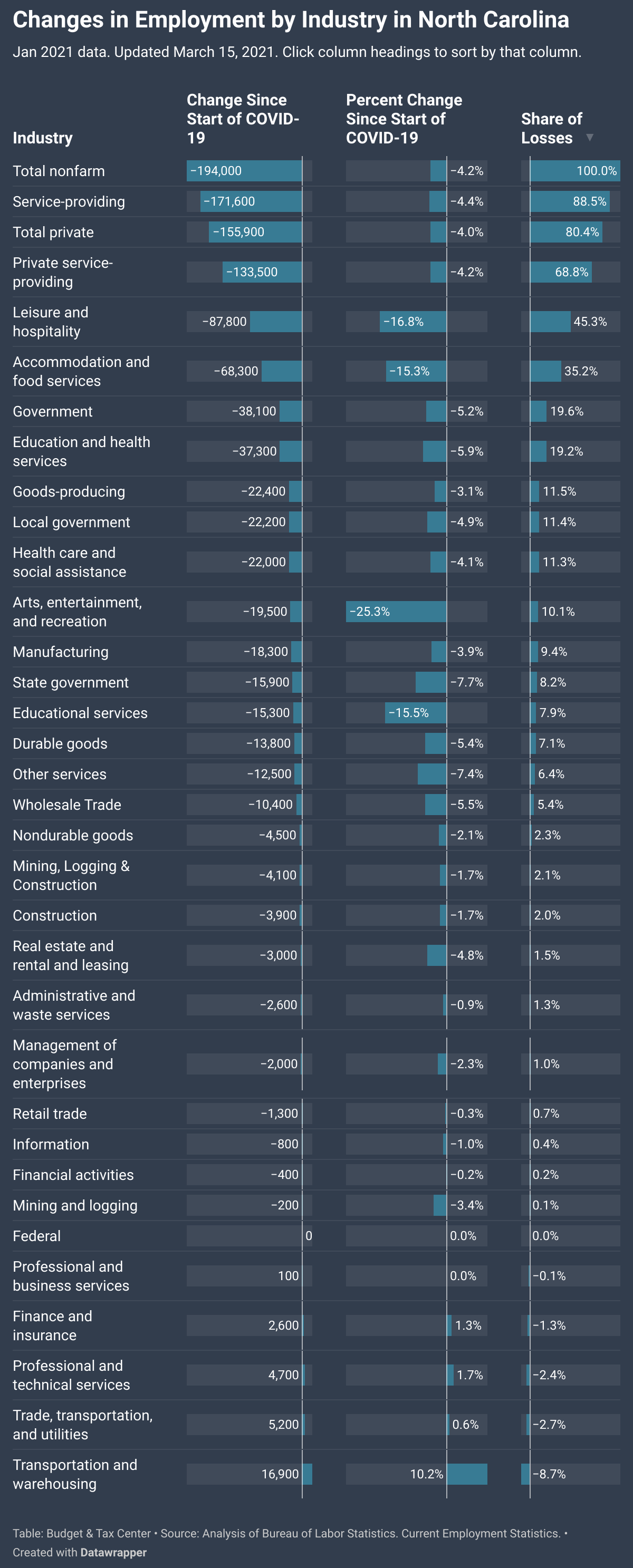Lost jobs in January highlight importance of federal rescue plan
RALEIGH (March 15, 2021) — Preliminary labor market figures for January underscore why the American Rescue Plan signed into law last week was so vitally needed. After months of slow recovery and a holiday spike in COVID-19 cases, North Carolina lost over 3,000 jobs in January, a clear sign our recovery is far from complete.
“The American Rescue Plan passed last week provides the kind of support at scale needed to turn toward a more just and inclusive recovery,” said Patrick McHugh, Research Manager with the North Carolina Budget & Tax Center. “Months of half steps had seriously hampered the pace of recovery in the latter part of 2020, so it’s encouraging to see our elected representatives enacting the kind of bold rescue plan families across North Carolina so desperately need.”
Click for charts with new labor market data
Economic challenges facing North Carolina include:
- Recovery has slowed dramatically in recent months: North Carolina added fewer than 30,000 jobs in the final quarter of 2020 after recovering over 230,000 jobs in May and June. All told, one-third of the jobs lost since the start of the recession have not been recovered, and North Carolina still needs to add nearly 195,000 jobs to get back to where we were before COVID-19.
- Recession is over for most highly paid North Carolinians while still devastating low-income workers. While not captured in the headline unemployment figures, job losses have fallen the hardest on North Carolinians with the least financial cushion. Data through mid-January show high paying jobs with annual wages over $60,000 have fully recovered. While the recession is effectively over for many people in good-paying jobs, nearly one quarter of the jobs that paid below $27,000 before the recession are still missing.
- Job losses are heavily concentrated in some industries, particularly among worst-paid workers: The COVID-19 recession has devastated workers in some industries, while others have almost fully recovered. The largest persistent job losses since February of last year have occurred in industries like Accommodation and Food Service (-68,300), Government (-38,100), Manufacturing (-18,300), Health Care and Social Assistance (22,000), Arts, Entertainment and Recreation (19,500), and Education Services (15,300).
For charts showing the most recent labor data and COVID-19 job data, visit the Budget & Tax Center’s Labor Market page at www.ncjustice.org/labormarket.
For more context on the economic choices facing North Carolina, check out the Budget & Tax Center’s Prosperity Watch report.
The nonpartisan Budget & Tax Center is a project of the NC Justice Center, which works to eliminate poverty in North Carolina by ensuring every household in the state has access to the resources, services and fair treatment it needs to achieve economic security.
FOR MORE INFORMATION, CONTACT Patrick McHugh, Budget & Tax Center Research Manager, at patrick.mchugh@ncjustice.org or 919-856-2183; or Mel Umbarger, Budget & Tax Center Senior Communications Specialist, at mel@ncjustice.org.
 Justice Circle
Justice Circle 